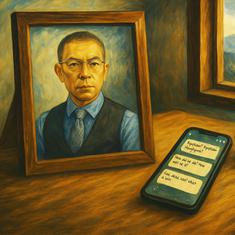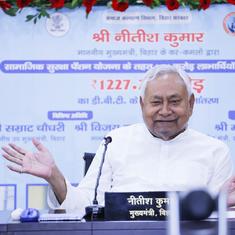Her ticket back to the city was for June 5. As soon as she saw the message, she cancelled her ticket and returned a week early.
Since Tuesday, thousands of people have gathered at a 55-acre plot of land in Mandala in the north-eastern area of Mankhurd to renew their demand for rehabilitation. All of them have taken leave from their day jobs and household responsibilities. Some like Choudhry have travelled several states to be a part of the movement.
In 2004 and 2005, the government demolished 85,000 houses in slums across Mumbai. Many of these were in Mandala, where Choudhry lived. The Ghar Bachao Ghar Banao Andolan, a city-wide movement grew out of that action in 2005. With activist Medha Patkar as its face, the movement has been demanding that the government rebuild demolished slum houses and prevent future demolitions from happening without rehabilitation.
The movement has inspired great loyalty. Shajahan Khan left her village in Sultanpur, Uttar Pradesh, in the middle of a wedding.
“Weddings might keep happening, but if we have to get our watan here, we will undergo any hardship,” Khan said. “If we don’t get our land today, then we will get it tomorrow. But we will not take it under illegal means.”
Scattered through the city
The displacement from Mandala left many without permanent homes. Many people who lost their houses remained in the area in rented rooms. Some returned to their villages or moved elsewhere in the city. For most, this is only the latest chapter in a long history of displacement.
Choudhry, for instance, left her village in Uttar Pradesh after riots that followed the demolition of the Babri Masjid in 1992 – only to be caught in the second round of violence in January 1993 in Mumbai. She and her husband survived. They initially rented a room in Kaula Bandar, on port land owned by the central government. In 1997, they moved to Mandala. She has been living in a rented home nearby ever since the demolition.
The movement is tightly organised in Mandala. A network of 19 committee leaders has met every Sunday for 11 years to plan their course of action. These leaders keep in touch with all 3,200 people, such as Choudhry and Khan, who have been a part of the movement right through.
In 2012, the movement even came close to a victory of some sort, when the central government promised that Mandala would be the pilot project of the Rajiv Awas Yojana for housing urban poor. But that has not happened.
Eleven years and several promises later, the land in Mandala remains unused, its former residents remain without home and there is no sign that the present government will be any more understanding than the last.
At the protest
In its fourth day of protest on Friday, small groups of people had begun to drift away from the large open tent in the middle of the site to chat. Around the tent, adults and children sold refreshments. Aatif Sheikh, born just a year before his home in Mandala was demolished, was selling small packets of chilled water for Rs 2. He said he sold packets worth around Rs 150 each day. He might use the money to buy socks and shoes for when school began.
Patkar, or Tai as she is better known, left the protest after two days to handle a court case. She would return, she said, as soon as her legal work was over. With Patkar gone, the atmosphere had grown lax, people said.
Leaders inside the tent did their best to keep spirits high by chanting slogans and singing the standard songs. Neha Jaimatai from Siddharth Nagar in Four Bungalows, Andheri, admonished those who stayed nearby for leaving the protest at night.
“If this was our land, we would not have stepped off it until the government gave in to our demands,” she proclaimed on the mic. “But all of you go back home. If you do not stay, how will anything happen?”
Only 20-25 activists remained at night, she said, after her turn at the mic was over. Around eight women had come with her from Siddharth Nagar. As they had done before and said they would do again, they had left their work and their children behind to boost the numbers in Mandala. All are active members of the andolan.
“We came here because we know that if the same thing happens with us, they will come to support us,” said Shajahan Khatim, 37. She joined the andolan in 2013, after her own house in Siddharth Nagar was demolished.
“We used to be afraid of getting beaten before we joined Tai,” added Fatima Sheikh, 52, also in the group. “We did not have the courage then, but she showed us how to fight.”










